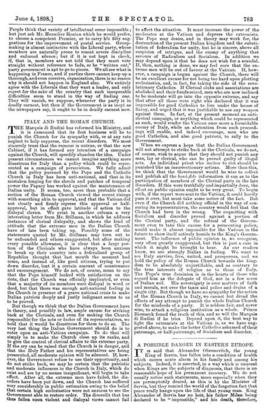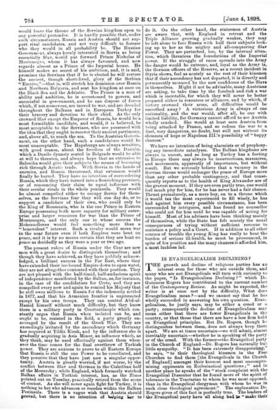A POSSIBLE DANGER IN EASTERN EUROPE.
IT is said that Alexander Obrenovitch, the young King of Servia, has fallen into a condition of health, which causes acute alarm in his family and among his subjects. Indeed, it is asserted, in a way which is unusual when Kings are the subjects of diagnosis, that there is no, reasonable hope of his permanent recovery. We do not usually notice such statements, more especially when they are peremptorily denied, as this is by the Minister of Servia, but they remind the world of the forgotten fact that peace really hangs upon the life of that young man. King Alexander of Servia has no heir, his father Milan: being declared to be "impossible," and his death, Iiherefore, would leave the throne of the Servian kingdom open to any powerful pretender. It is hardly possible that, under buch circumstances, Russia and Austria should not sup- port rival candidates, and not very difficult to foresee who they would in all probability be. The Russian Government, always keenly interested in Servia as being essentially Slav, would put forward Prince Nicholas of Montenegro, whom it has always favoured, and now regards almost as a Prince of the Imperial house. He himself makes no secret of his ambition, and, it is said, promises the Servians that if he is elected he will restore the ancient, though short-lived, glory of the Serbian Empire,"—that is, will stretch his dominion over Bosnia and Northern Bulgaria, and seat his kingdom at once on the Black Sea and the Adriatic. The Prince is a man of ability and ambition, he is accustomed to govern, and successful in government, and be can dispose of forces which, if not numerous, are inured to war, and are dreaded throughout the Balkans and in European Turkey for their bravery and devotion to their chief. As the only crowned Slav except the Emperor of Russia, he would be a most formidable candidate, and would, it is believed, be most acceptable to the Servians, who are possessed with the idea that they ought to recover their ancient patrimony, and, above all, to reach the sea. To the Austrian Govern- ment, on the other hand, such a candidature would be most unacceptable. The Hapsburgs are always sensitive, with good reason, about the freedom of the Danube, which a Danilo dynasty seated in Belgrade would be able at will to threaten, and always hope that an extension to Salonika would give their subjects the means of becoming rich through Asiatic trade. With Servia in the hands of enemies, and Bosnia threatened, that extension would Enally be barred. They have no intention of surrendering Bosnia, which they have turned into a. flourishing province, or of renouncing their claim to equal influence with their secular rivals in the whole peninsula. They would be almost compelled either to occupy Servia for them- selves, as the Servians fear they will one day do, or to support a candidate of their own, who could only be the King of Roumania., who is the one Prince in Eastern Europe possessing both more capacity for military enter- prise and larger resources for war than the Prince of Montenegro, and the only one in whose success the Hohenzollerns would feel something more than a -"benevolent" interest. Such a rivalry would mean war in the near future even if both Empires were bent on peace, and it is by no means certain that they are bent on peace as decidedly as they were a year or two ago.
The present rulers of Russia under the Czar are new men with a great desire to distinguish themselves ; and though they have achieved, as they have publicly acknow- ledged, a brilliant success in the Far East, where they have extended their ice-bound Empire down to open water, they are not altogether contented with their position. They are not pleased with the half-timid, half-audacious spirit of independence manifested by the Sultan, as, for instance, in the case of the candidature for Crete, and they are compelled every now and again to remind his Majesty that he still owes millions to Russia for the indemnity settled in 1877, and that his Armenian frontier is unprotected except by his own troops. They can control Abd-ul- Hernia himself without much difficulty, but they know there is a military party in Constantinople which con- stantly urges that Russia when isolated can be, and ought to be, resisted in the field, a party greatly en- couraged by the result of the Greek War. They are exceedingly irritated by the ascendency which Germany has acquired at Yildiz Kiosk, and by the influence she is gradually acquiring in Asia Minor, an influence which, as they think, may be used effectually against them when- ever the time comes for the final overthrow of Turkish power. They are anxious to prove to all Eastern Europe that Russia is still the one Power to be conciliated, and they perceive that they have just now a singular oppor- tunity. Austria is greatly worried, if not worse, by the conflict between Slav and German in the Cisleithan half of the Monarchy ; while England, which formerly watched Balkan affairs in Turkish interest, has, as the Times pointed out on Tuesday, practically retired from the scene of contest. As she will never again fight for Turkey, it is nothing to her who advances or recedes within the Balkan Peninsula. There is a vague wish that Austria should prevail, but there is no intention of helping her to do it. On the other hand, the statesmen of Austria are aware that, with England in retreat and the Triple Alliance growing gradually weaker, they may be left alone to face Russia with half their subjects look- ing up to her as the mighty and all-conquering Slav Power. They are perturbed, too, by the internal situa- tion, which threatens the foundations of the Imperial power. If the struggle of races spreads into the Army the danger would be extreme, and, loyal as the Army is, the German officers of the Reserve, as a recent incident in Styria shows, feel as acutely as the rest of their kinsmen that if their ascendency has not departed, it is directly and permanently menaced by the new confidence of the Slays in themselves. Might it not be advisable, many Austrians are asking, to take time by the forelock and risk a war which is inevitable, for which they will never be better prepared either in resources or alliances, and by which, if victory crowned their arms, all difficulties would be smoothed away ? A victorious Army is always of one nationality, and the war would, after all, be one with limited liability, for Germany cannot afford to see Austria wholly crushed. She would at least save Austria from being attacked by France, and so reduce the war to a duel, very dangerous, no doubt, but still not without its elements of hope or Napoleon ILL's possibility of "happy chances."
We have no intention of being alarmists or of prophesy- ing any immediate cataclysm. The Balkan kingdoms are always in unrest, and so long as Turkey has a footing in Europe there may always be insurrections, massacres, and movements, apparently of importance, but without result. But we seriously believe that a vacancy in the Servian throne would endanger the peace of Europe more than any other probable contingency, and that conse- quently reports as to the health of King Alexander are of the gravest moment. If they are even partly true, one would feel much pity for him, for he has never had a fair chance. Thrust prematurely, as a mere boy, on to a. throne which it would tax the most experienced to fill wisely, he has had against him every possible circumstance, has been surrounded by intriguers, and has found no counsellor who could act for him until he was capable of acting for himself. Most of his advisers have been thinking mainly of themselves, while the State has felt acutely the usual consequences of trying without sufficient revenue to maintain a policy and a Court. If in addition to all other sources of trouble the young King has really to bear the burden of serious ill-health, he must be pronounced, in spite of his position and the many chances it afforded him, a most luckless lad.



































 Previous page
Previous page